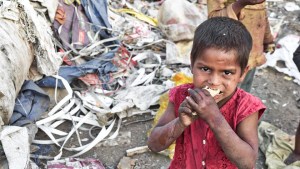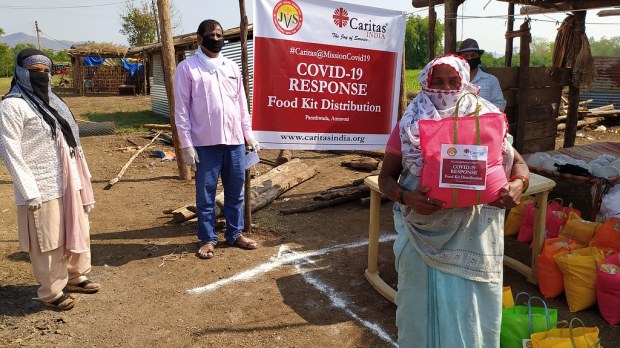The global health emergency victimizes not only those who get the disease, but also those affected by the economic ramifications. This is true especially in the poorest countries, where the consequences of the virus are truly unimaginable for millions of people.
We met with Aloysius John, secretary general of Caritas Internationalis, the organization that coordinates the national and regional Caritas organizations around the world.
Costantini:Aftershocks of the pandemic may well be even more complicated and deadly than the impact of the virus itself, especially for the most vulnerable communities in the poorest countries. How is Caritas facing this emergency?
Aloysius John: The first half of 2020 was a nightmare for our globalized world. COVID 19, declared a pandemic, turned the whole world viral. Hundreds of thousands died all over the world and the globalized world started to act in solidarity against the pandemic. Taken by surprise, politicians and scientists started to propose – or in some cases, impose – a certain number of social behaviors: Isolation of the population, closing of borders, important sanitary measures, and social distancing became the norm. Normal citizens became over conscious of the existence of the other and the other being a threat, because he or she could transmit the virus.
People left their normal working methods to adopt new ways of working, acquiring new working habits. Smart working, teleworking, work at home, etc. started to become the new mode in a context where everything was uncertain, except one thing: the unknown future and where the virus was leading us!
“The worst is not there yet, it will be the aftermath of the pandemic,” Pope Francis said when we met him in March.
“We must prepare for the future. This has to be undertaken today and must concern all of us,” he urged.
In these words, we are sure that the impact of the Covid-19 and what this pandemic is going to produce will be the most important challenge. Already the World Food Programme has announced that there will be a food insecurity problem with more than 300 million people being affected by hunger in the near future. The growth of the developing countries will be affected seriously as a consequence of the economic recession in the north.

Agricultural activities are at a standstill due to the difficulty of work during the period of confinement. The poorest will be the most affected and this leads to the impoverishment of the most vulnerable. Access to basic facilities such as medical aid and basic healthcare for the most vulnerable will also be a major concern. Covid-19 must be a new beginning wherein the poorest are cared for, their basic needs are addressed as a priority, and they live in dignity.
Caritas Internationalis activities to respond to COVID-19
Caritas Internationalis, along with the Dicastery for Integral Human Development, has undertaken a certain number of activities to respond to Covid-19.
In the first place, the Covid Response Fund was created to support projects for the most vulnerable communities in the poorest countries. This was in response to Pope Francis’ call for witnessing through concrete gestures of the universal Church’s solidarity. As of today, around 30 projects have been funded. Through these funds, local Caritas put in place different kinds of activities to build awareness, distribution of food packets – because poor people could not have access to food due to lack of means and jobs – as well as health care, through hygiene kits, sanitary items etc.
Another area where Caritas is focusing today, is to promote advocacy activities that would go toward addressing the post Covid-19 economic crisis from a social justice point of view. Today it is time to be agile and act with conviction, asking for the writing off or reduction of the international debt and using these funds for local community based development. Faith-based organizations, especially Caritas offices, are well placed and can be effective protagonists in promoting local micro development through these funds. Caritas will undertake advocacy activities in this field, motivating decision-makers to engage in this regard.
Caritas Member Organisations have also contributed to implement around 15M€ worth of projects in different parts of the world bilaterally to build awareness and mobilize immediate help in terms of food aid, distribution of hygiene kits and sanitary items and other articles of first necessity to the poorest and most vulnerable population.
Covid-19 is certainly going to affect and influence the humanitarian response.
If I look back at the last three decades, there are three important moments that influenced the humanitarian activities.
In 1992 the Chittagong cyclone and tidal waves in Bangladesh brought in the notion of disaster preparedness and over the period of time it became part of the humanitarian and development activities.
The super cyclone and the Gujarat Earthquake later went one step further integrating the disaster preparedness, putting the emphasis on linking relief, rehabilitation and development. This was an important step further to look at development activities in a different perspective. The third moment was the Tsunami experience and this was a major step forward.

Read more:
Jesus asks uncomfortable, embarrassing questions, says pope
Costantini: Working with Caritas, you were director of the Asia tsunami operations, facing the devastation of the 2004 tsunami. We are facing now a kind of world tsunami. As mentioned, the World Food Programme projects worldwide that the number of people on the brink of starvation will double as a result of Covid-19 and could reach 230 million people. What are the lessons you learned from the tsunami that will help you to face the present situation?
Aloysius John: The tsunami experience was important because it was a synthesis of all that has been undertaken since the early 90s, leading to a reflection on Disaster Risk Reduction. Accountability towards the beneficiaries, the importance of strengthening the local protagonists, and in one sentence, a people-centered disaster response which was holistic and integral because it took into consideration the environment. The tsunami experience promoted the idea of implementing the right action for the relevant needs of the people.
Now Covid-19 is taking us one step further.
It brings to the fore the need to empower the local actors in the Global South and also to build a relation of confidence and trust. This disaster is certainly going to accelerate the localization plan, wherein the local Caritas must be empowered to implement projects and also act with appropriate means.
Now there is awareness that disaster response or development projects cannot be the brainchild of the north, and secondly Covid-19 has also highlighted that disaster response must be undertaken in a spirit of co-responsibility. Priority must be given to the local actors who must be empowered, to technically think, develop, and implement their own projects by taking along the local communities.
The future of the humanitarian logic will be different with more space and place for the Global South to play their legitimate role.
This will also bring the traditional humanitarian actors in the north to define their role in the new paradigm of partnership.
The Covid-19 response will need more means and political will to address the pandemic, but unfortunately the means available are far from sufficient and there is a need to continue the request to join hands with Caritas and other organisations to support the most vulnerable.
Costantini:How did you decide to give your life to the service of our brothers and sisters through Caritas? Can you tell us something about your call to help?
Aloysius John:Regarding my personal engagement in Caritas, it is a complex question to answer. It all dates back to the late 70s. It was in 1977, Vijayawada in Andhra Pradesh was affected by a storm followed by tidal waves and the death toll was quite high. Some of my friends older than me went to help the poorest. Fr. Ceyrac, a French Jesuit whom I knew well, was on the frontlines organizing the support of the victims. His motivation for action was, “how can a human person find happiness and fulfilment when his brother is in suffering and is in tribulation?” His key words for undertaking action were “compassion, service, empowerment.”
One day in 1978, I met him and we were discussing the Vijayawada response and he explained the following, “The urge to serve comes out of compassion and service with compassion empowering the one who is served. Once the person is empowered we see that he or she has realised that dignity is owed to them”. This still guides me in my mission at Caritas.
In 1980 I joined a caritas center in Chennai to help the poorest of the poor, the lepers and their children. The slogan in this center was “no one has the right to be happy alone”. These reflections helped me to reach out to the poorest and serve them. It is the encounter with the poor, encounter with those who are left on the wayside of the society that nourished my values and gave meaning to my faith. I can say the encounter with the poor leads to conversion and transformation of ourselves and attitudes.
Service to the poorest brothers became an integrated part of my faith and even today it animates and conditions my professional attitude.
Costantini:What has been the most moving moment in your life serving at Caritas?
Aloysius John:The most moving moment in my service at Caritas is when I see the communities that were helped became autonomous and liberated. There you feel a sentiment of fulfilment, because the community has found its human dignity and can live its vocation of human being to the fullest. The most moving experience was the development of the Chakma tribes in the Chittagong Hill Tract in Bangladesh. I supported this project with Caritas Bangladesh from 1989 till 1994-95. I met these communities many times and could see their concrete growth and development.

Read more:
Pope Francis: “The preferential option for the poor is at the center of the Gospel.”
Costantini: What is the added value of Caritas? How does Caritas make a difference in the world today?
Aloysius John:Caritas is beyond a development organisation or a NGO. It is the service of the Church with a clear vision. Pope Benedict XVI wrote, Diakonia or the work of Charity is an integral part of the three fold missions of the Catholic Church. Liturgy, the Proclamation of the Gospel, and the work of Charity are interrelated and presuppose each other. The work of Charity is the mission entrusted to Caritas.
The purpose of this mission entrusted by the Church is to serve, accompany, defend, and express solidarity and love through concrete actions in the form of projects or other activities. This is exactly what we have done through the Covid-19 response.

Read more:
Filipino Cardinal Tagle shares his own migrant story with UN audience

